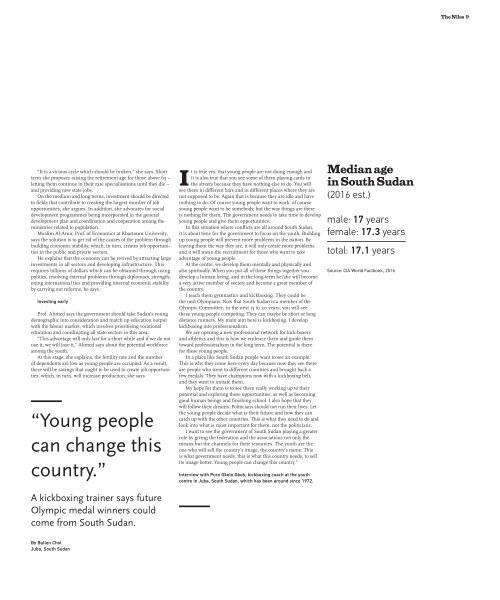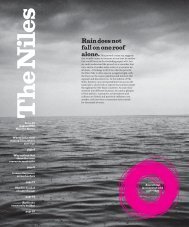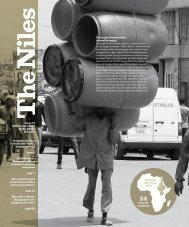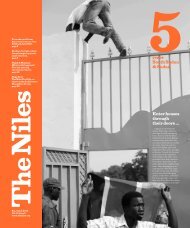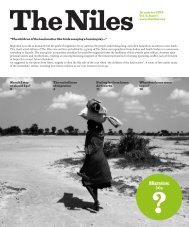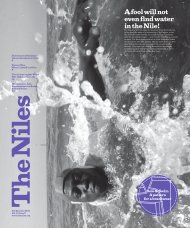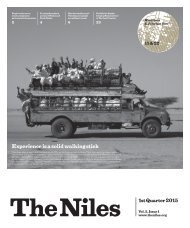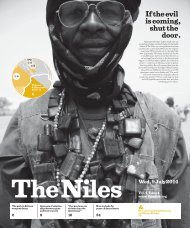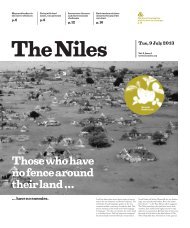Nobody has been sent to see...
Around 50 million people live in Sudan and South Sudan. They marry, they have children, they work – like the fisherwoman in this picture – they live in peace and they wage war against one another. But what awaits them in the future? Is it really as the Nuer proverb suggests, that no one knows what tomorrow brings? Some conflicts, experienced by both countries in the past years, were expected, some predictions could be drawn from past statistics. Correspondents from The Niles portrayed people from both countries through all stages of life and have briefly touched upon what it means to be Sudanese or South Sudanese.
Around 50 million people live in Sudan and South Sudan. They marry, they have children, they work – like the fisherwoman in this picture – they live in peace and they wage war against one another. But what awaits them in the future? Is it really as the Nuer proverb suggests, that no one knows what tomorrow brings? Some conflicts, experienced by both countries in the past years, were expected, some predictions could be drawn from past statistics. Correspondents from The Niles portrayed people from both countries through all stages of life and have briefly touched upon what it means to be Sudanese or South Sudanese.
Create successful ePaper yourself
Turn your PDF publications into a flip-book with our unique Google optimized e-Paper software.
The Niles 9<br />
“It is a vicious cycle which should be broken,” she says. Short<br />
term she proposes raising the retirement age for those above 65 –<br />
letting them continue in their rare specialisations until they die –<br />
and providing new state jobs.<br />
On the medium and long terms, investment should be directed<br />
<strong>to</strong> fields that contribute <strong>to</strong> creating the largest number of job<br />
opportunities, she argues. In addition, she advocates for social<br />
development programmes being incorporated in the general<br />
development plan and coordination and cooperation among the<br />
ministries related <strong>to</strong> population.<br />
Muslim Al-Amir, Prof. of Economics at Khar<strong>to</strong>um University,<br />
says the solution is <strong>to</strong> get rid of the causes of the problem through<br />
building economic stability, which, in turn, creates job opportunities<br />
in the public and private sec<strong>to</strong>rs.<br />
He explains that the economy can be revived by attracting large<br />
investments in all sec<strong>to</strong>rs and developing infrastructure. This<br />
requires billions of dollars which can be obtained through using<br />
politics, resolving external problems through diplomacy, strengthening<br />
international ties and providing internal economic stability<br />
by carrying out reforms, he says.<br />
Investing early<br />
Prof. Ahmed says the government should take Sudan’s young<br />
demographic in<strong>to</strong> consideration and match up education output<br />
with the labour market, which involves prioritising vocational<br />
education and coordinating all state sec<strong>to</strong>rs in this area.<br />
“This advantage will only last for a short while and if we do not<br />
use it, we will lose it,” Ahmed says about the potential workforce<br />
among the youth.<br />
At this stage, she explains, the fertility rate and the number<br />
of dependents are low as young people are occupied. As a result,<br />
there will be savings that ought <strong>to</strong> be used <strong>to</strong> create job opportunities,<br />
which, in turn, will increase production, she says.<br />
“Young people<br />
can change this<br />
country.”<br />
A kickboxing trainer says future<br />
Olympic medal winners could<br />
come from South Sudan.<br />
It is true yes, that young people are not doing enough and<br />
it is also true that you <strong>see</strong> some of them playing cards in<br />
the streets because they have nothing else <strong>to</strong> do. You will<br />
<strong>see</strong> them in different bars and in different places where they are<br />
not supposed <strong>to</strong> be. Again that is because they are idle and have<br />
nothing <strong>to</strong> do. Of course young people want <strong>to</strong> work, of course<br />
young people want <strong>to</strong> be somebody, but the way things are there<br />
is nothing for them. The government needs <strong>to</strong> take time <strong>to</strong> develop<br />
young people and give them opportunities.<br />
In this situation where conflicts are all around South Sudan,<br />
it is about time for the government <strong>to</strong> focus on the youth. Building<br />
up young people will prevent more problems in the nation. By<br />
leaving them the way they are, it will only create more problems<br />
and it will mean the recruitment for those who want <strong>to</strong> take<br />
advantage of young people.<br />
At the centre, we develop them mentally and physically and<br />
also spiritually. When you put all of these things <strong>to</strong>gether you<br />
develop a human being, and in the long-term he/she will become<br />
a very active member of society and become a great member of<br />
the country.<br />
I teach them gymnastics and kickboxing. They could be<br />
the next Olympians. Now that South Sudan is a member of the<br />
Olympic Committee, in the next 15 <strong>to</strong> 20 years, you will <strong>see</strong><br />
these young people competing. They can maybe be short or long<br />
distance runners. My main aim here is kickboxing. I develop<br />
kickboxing in<strong>to</strong> professionalism.<br />
We are opening a new professional network for kick-boxers<br />
and athletics and this is how we embrace them and guide them<br />
<strong>to</strong>ward professionalism in the long term. The potential is there<br />
for these young people.<br />
In a place like South Sudan people want <strong>to</strong> <strong>see</strong> an example.<br />
This is why they come here every day because now they <strong>see</strong> there<br />
are people who went <strong>to</strong> different countries and brought back a<br />
few medals. They have champions now with a kickboxing belt,<br />
and they want <strong>to</strong> imitate them.<br />
My hope for them is <strong>to</strong> <strong>see</strong> them really working up <strong>to</strong> their<br />
potential and exploring these opportunities, as well as becoming<br />
good human beings and finishing school. I also hope that they<br />
will follow their dreams. Politicians should not run their lives. Let<br />
the young people decide what is their future and how they can<br />
catch up with the other countries. This is what they need <strong>to</strong> do and<br />
look in<strong>to</strong> what is most important for them, not the politicians.<br />
I want <strong>to</strong> <strong>see</strong> the government of South Sudan playing a greater<br />
role by giving the federation and the associations not only the<br />
means but the channels for their resources. The youth are the<br />
one who will sell the country’s image, the country’s name. This<br />
is what government needs, this is what this country needs, <strong>to</strong> sell<br />
its image better. Young people can change this country.”<br />
Interview with Puro Okelo Obob, kickboxing coach at the youth<br />
centre in Juba, South Sudan, which <strong>has</strong> <strong>been</strong> around since 1972.<br />
Median age<br />
in South Sudan<br />
(2016 est.)<br />
male: 17 years<br />
female: 17.3 years<br />
<strong>to</strong>tal: 17.1 years<br />
Source: CIA World Factbook, 2016<br />
By Bullen Chol<br />
Juba, South Sudan<br />
tn9_20161207_cc2014.indd 9 2016/12/7 11:29


